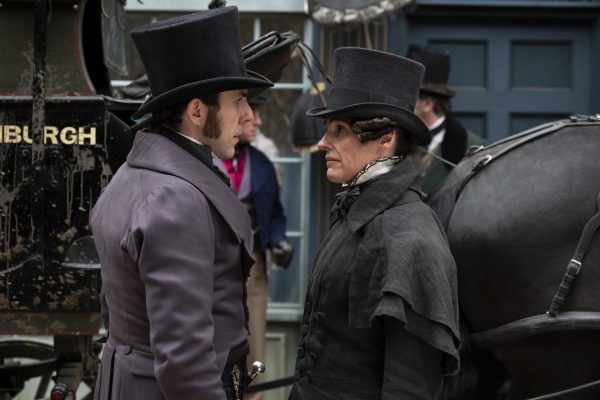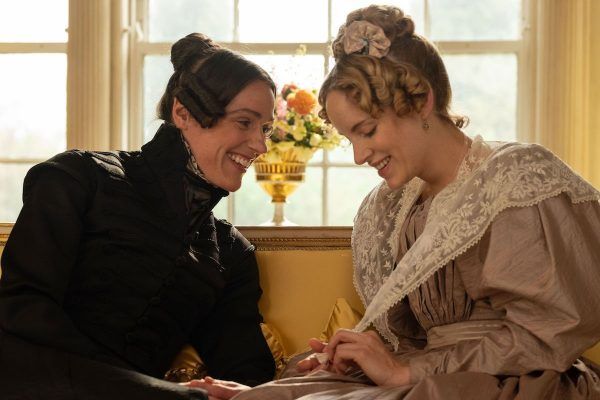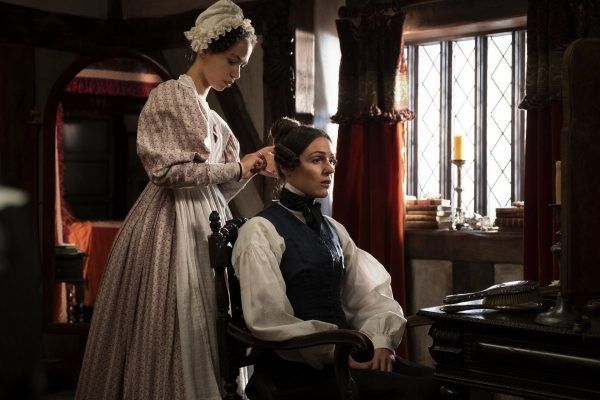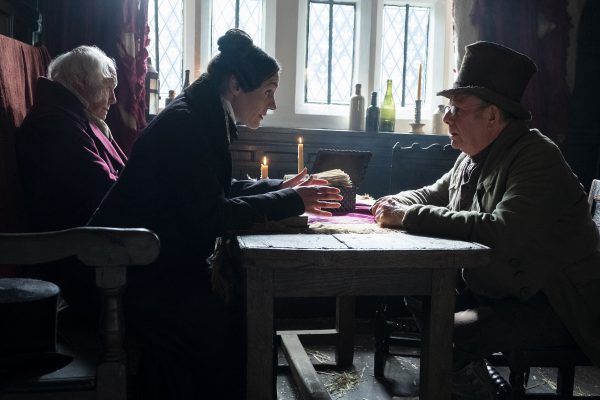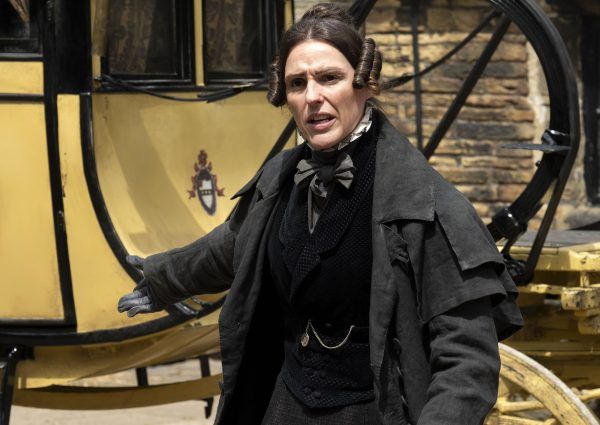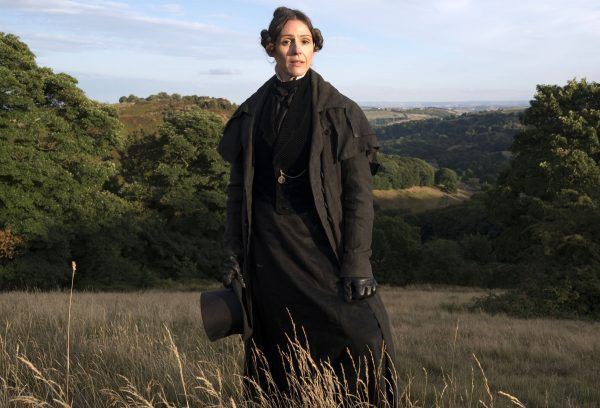From writer/director Sally Wainwright, the eight-episode HBO/BBC drama series Gentleman Jack is set in 1832 Halifax, West Yorkshire in England and focuses on landowner Anne Lister (exquisitely played by Suranne Jones), a woman who bucked society’s expectations at every turn. Determined to transform the fate of her ancestral home, Shibden Hall, by marrying well, Lister charms her way into high society and uses her natural charisma to pursue the one she wants, only she has no intention of marrying a man. Never one to pretend to be anything other than exactly who she is, Lister sets her sights on wealthy heiress Ann Walker (Sophie Rundle).
During this 1-on-1 interview with Collider, show creator Sally Wainwright talked about the incredible female characters she’s had a hand in bringing to life, over the course of her career, how she first got introduced to Anne Lister and why she found her to be such a compelling character, why it took about 20 years to finally bring Gentleman Jack to the screen, basing this series in historical fact, with the five millions words of Anne Lister’s journals, why Suranne Jones was the perfect person to bring her to life, how she also came to direct this series, the decision to break the fourth wall, and the challenge of fitting this story into eight hours.
Collider: Over the last 25 years, you’ve created some of the best shows on British television, many of which have found their way to audiences in the U.S. Were you ever surprised, along the way, at how well your work translates to audiences in other countries?
SALLY WAINWRIGHT: Yes and no. Any good story is universal. Whatever culture you come from, if it’s authentic to human nature and the way people behave, interact and respond to the world around them, human emotion translates to any culture. But I’m always happily surprised, whenever I get a good response anywhere.
You’ve said previously that you write the stories that you want to see, and that you just happen to find women more interesting. What’s it felt like to be able to bring so many different types of female characters to the screen, that we likely would never have gotten to see, if it weren’t for you taking the time to bring them to life?
WAINWRIGHT: I find it really exhilarating, obviously. I think I’m lucky, in that I do genuinely like writing about women. I’m inside of a woman’s head, so why wouldn’t I? That’s where I can go to the deepest places, in my own head, because I am a woman. I’ve actually started to realize how rare I am, in that most people don’t actually get excited about writing about women. Most writers seem to get more excited about writing about men, even when they’re women. When I first set out and started writing things, like At Home with the Braithwaites, years ago, I didn’t know that was a thing. I just wrote what I wanted to write and what I felt passionate about. It’s not like I’m not interested in men. I’ve just never thought it wasn’t an equal playing field. Certainly, as I’ve gotten older and people have started to write about it, I’ve realized that it is unusual that most people don’t write about women in any great depth, or with any real empathy, insight, and understanding. Obviously, a lot of people do, but predominately, people do seem a lot more engaged with male protagonists.
It was also interesting to read about how, a lot of times, people see male characters as weak when they’re in the supporting role because they’re so used to seeing them as lead characters.
WAINWRIGHT: I used to work with Suranne [Jones] on a show, called Scott & Bailey, where she played a female cop. It was about a major incident team syndicate, so they were in a group of men. Lesley [Sharp] played DC Scott and Suranne played DC Bailey, and it was about them. I got criticized for writing weak men, and people said, “You’re making the women look stronger, by making the men weak.” But the men weren’t weak. They were three-dimensional characters. They just weren’t the focus of the show, so people interpreted that as weak men, or weak characters, and they really weren’t. They were secondary characters, but they were actually fully fleshed out and three-dimensional, with warts and all. It was interesting that they called the men weak. Scott and Bailey were portrayed as complex and flawed, and they weren’t perfect women, by any means, but it was this misinterpretation that, if men are in the secondary role, they’re weak characters, and they weren’t weak, at all.
I love this show and this character, and it seems like the perfect time to have a show about Anne Lister come out, but you’ve actually been trying to make this happen for a long time. Why do you think it took so long to get this made?
WAINWRIGHT: I first pitched it in about 2002, and had I got it greenlit, at that time, it would’ve been a very, very niche product. It would’ve been hidden away on the schedule of BBC Two, rather than what it’s got now, which is a massive primetime slot and a massive American company on board, with a primetime slot. So, I don’t regret that it didn’t happen 20 years ago. It’s given me 20 years longer with the journals. It’s allowed me to cast Suranne Jones in the lead, which wouldn’t have happened 20 years ago ‘cause she wouldn’t have been old enough. And times have changed. That we have a very healthy discourse now, about gender and sexuality, has only happened in the last 5 or 10 years.
At what point in the process of developing the series did you start to think about casting, and specifically about casting Suranne Jones as Anne Lister?
WAINWRIGHT: This was unusual for me. I couldn’t picture who I wanted to play the lead. I usually write things when I’ve got somebody really clearly in mind. It’s quite a rare thing for me not to be able to picture anyone. And even though I’ve worked with Suranne three times before, she didn’t spring into my head, which I think is because I predominantly think of Suranne as a very, very contemporary actress, in very contemporary drama. In the end, that’s actually what made it most exciting. When her name cropped up, it did suddenly seem quite exciting because physically Suranne does resemble Anne Lister, in that she’s very athletic. Anne Lister was very physically fit. She made the first recorded ascent of Mt. Vignemale in the Pyrenees. She’s the kind of person who could walk 25 miles in a day, and not feel it. She was really, really physically fit, and Suranne is very physically fit and in really good shape. But it was also Suranne’s mental energy. Anne Lister was phenomenally intelligent. She had a very brilliantly inquisitive mind, and she was buzzing with mental energy, all the time, and Suranne is like that. She’s always got a thousand and one ideas buzzing around in her head, and you can feel it coming off of her.
She came in to read, which she wouldn’t normally do in England. She’s the kind of actor that you make offers to, rather than ask to come in and read, but because HBO wasn’t quite as familiar with her, as we are in England, we asked her to come in and read. Immediately, it was clear that she had a real insight into how to do this, and to who this woman was. It was just a delightful moment. I was worried that I could never find Anne Lister. I was worried that nobody would get everything there was to get about Anne Lister, and that there was nobody out there who was big enough and bold enough, and subtle enough and nuanced enough. It was mad that it ended up being Suranne, who I knew really well and who I’d worked with, so many times before.
How did you originally come across Anne Lister, and what was it about her that made you think she was compelling enough to want to tell her story, and to spend so many years dedicating yourself to telling her story?
WAINWRIGHT: She’s very compulsive. She really gets under your skin. Once she’s got her grips into you, you’re there for life. She’s a really good person to have in your life. She’s very uplifting. She had a really positive outlook on life. For her, life was for living. She had a lot of setbacks in her life. She was a very passionate human being. She had her heart broken, so many times, but she seemed to have this incredible ability to just dust herself down and move forward, and put things behind her while looking for the next thing. She had very profound religious belief. She put her faith in God, and she had this optimism about life and the world. I hope that doesn’t make her sound naive because she wasn’t naive, at all. She was a very practical-minded woman, but she did have this brilliant, wonderful optimism about the world and everything in it.
And as to how I first came across Anne Lister, I grew up in Halifax, where Shibden Hall is, and I used to visit Shibden Hall a lot, in the 1970s, as a kid, but there was no mention of Anne Lister. She’d married another woman, 180 years ago, people just didn’t talk about stuff like that in the 1970s. I started to become aware of her more in the 1990s, when people did start to talk about her. And then, I read Jill Liddington’s book, Female Fortune, that she published in 1998, and that’s when I got my first really big hit of just who Anne Lister was, and it was immediately clear to me, from the book, that I had just completely fallen for this extraordinarily clever, charismatic, engaging woman. It made me fall in love with my hometown, which as a teenager, I couldn’t wait to leave. I discovered Anne Lister, and suddenly my hometown became magical to me because this extraordinary woman had lived there. It became really clear to me that this was somebody to dramatize and present to the world, and it’s so exciting that we are doing that. A lot of the journals have never been transcribed. It’s a massive journal. It’s a huge document. Even though there are a number of books out there about her, there’s a fraction of the journal that is still being transcribed, so I feel like the world has yet to discover Anne Lister, and when they do, they’re gonna be blown away by her. She should be globally famous. I think she will be, eventually, but what’s exciting is that that’s a process that’s still happening because she’s been hidden away for so long.
Did you always want to direct, along with writing this, or was that something that came up, along the way?
WAINWRIGHT: I’ve wanted to direct for years and years and years. When I was at university, I wrote my first proper full-length stage play, and I directed it, and we took that to the Edinburgh Festival. It’s something that I’ve always wanted to do, but then my writing career took off, and other people were brought in to direct my work. I labored under the misapprehension that, to be a director, you had to have been trained, and you had to have done something special, and I just hadn’t done whatever it was to be a director. So, I always this passion to be a director, which never went away. I used to ask to direct my own stuff for people, but I got knocked back, a number of times. But then, when I wrote Happy Valley, I said that, if I wasn’t gonna direct it, I was gonna write it. I was given a bit of a crash course on directing, and I knew that I could do it. I knew I was gonna bring the same instincts to it that I bring to writing, and I love working with actors. I love creating stuff together. So, for me, directing is an extension of writing. It feels like part of the same process. It’s a very different discipline, but it seemed like part of the same process. It’s certainly something that I’ve always wanted to do, that’s never gone away. I love doing it. The only time that I feel really alive is when I’m directing.
What was it that led you to allow Anne Lister to break the fourth wall? Was it just a need to provide some insight that the viewers wouldn’t otherwise get?
WAINWRIGHT: For me, that was very much about creating an intimacy between Anne Lister and the viewer, in a way that you feel an intimacy between her and yourself when you read the real journal, and not just look at a digitized copy of the journal. We predominantly work from digitized copies, but I’ve been into the archives, a number of times, and spent time with the real journal, and it’s quite awe inspiring and emotional because you could be the first person who’s ever looked at that page. There’s probably only about four people in the world who have read the entire diary. It’s that big, and it’s most of it is not transcribed. You have to read it in the original, if you want to read the whole thing. So, you could be literally only the fourth of fifth person who has ever looked at that page, and you feel this very intimate moment with Anne Lister, like you’re having a connection with her. And for me, allowing Suranne to speak to the camera, as Anne Lister, was trying to recreate that feeling and intimacy that you get from reading her journals.
How did this series come to be eight parts? Was there some discussion about the length, and figuring out the right amount of time to tell the story of Anne Lister?
WAINWRIGHT: I wanted to write what I hoped would feel like an epic drama about Anne Lister because she’s an epic character. I also felt that there was just too much information in the journals. There’s so much story in the journals, and the series is very true to the journals. I haven’t invented a lot. I’ve taken a little bit of poetic license, here and there, but it’s very authentic and very true to the journals. Even with eight episodes, we’re still having to make quite painful choices about what not to include. I wish that we’d done 10 episodes. We’ve covered two years in those eight hours, and here’s so much more we that we could’ve told, in those eight hours.
Gentleman Jack airs on Monday nights on HBO.


